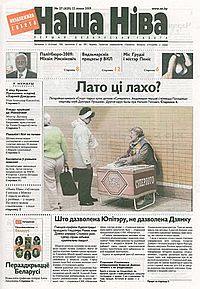- Nasha Niva
-
Наша Ніва
Nasha NivaType Weekly newspaper Owner VPUP Surodzichy Editor Andrej Skurko Founded 1906 Language Belarusian Headquarters pr. Rakasoŭskaha 102-71, Minsk, Belarus Circulation over 6,000[1] Official website www.nn.by Nasha Niva (Belarusian: Наша Ніва, Naša Niva, literally Our field) is one of the oldest Belarusian weekly newspapers founded in 1906 and re-established in 1991.
The current editor-in-chief is Andrej Skurko, who succeeded Andrej Dyńko.
Contents
History
1906-1915
Nasha Niva logo in the early 20th century (written in the Belarusian Latin alphabet)
The newspaper was founded in 1906 by members of the Belarusian Socialist Union (Hramada) in Vilna (modern Vilnius) that was a centre of the Belarusian national movement at that time.
Nasha Niva was among the first newspapers in Belarusian language. It published news about Belarus and literary works by Belarusian authors. In 1915 the newspaper was closed down because of the World War I. During the Soviet rule Nasha Niva was claimed to be “counter-revolutionary” and “capitalist” despite the fact that its founders and authors were mostly adherents of socialism.
Since 1991
In 1991 the newspaper was re-established in Vilnius by the editor-in-chief Siarhiej Dubaviec.
Under the presidency of Alexander Lukashenko the newspaper was subjected to state pressure. At one point in the late 1990s there was an attempt to close down the newspaper because of its use of Taraškievica orthography.[citation needed]
In October 2003, former Czech President Václav Havel granted the cash portion of the Hanno R. Ellenbogen Citizenship Award to Nasha Niva editor Andrey Dynko. The Hanno R. Ellenbogen Citizenship Award is given each year by the Prague Society for International Cooperation to an individual who has dedicated his or her life to public service with the stipulation that the financial portion of the award be passed to a gifted young person. "I pass this award to Mr. Dynko because we, who have benefited so much from international solidarity, must show solidarity ourselves," Havel said at the award ceremony in Prague. "'Nasha Niva' in Belarus is a symbol of independence on the one hand and an island of freedom on the other."[citation needed]
Since 2006 Nasha Niva was expelled from the media subscription system of Belarus (controlled by the state monopolist Belposhta) and has been distributed by enthusiasts until its re-inclusion into the subscription system in late 2008.[citation needed]
In April 2006 the ideology administration of Minsk executive committee ordered Nasha Niva to vacate their offices in an attempt to close the paper. The staff members sent letters of appeals to Lithuania to apply to UNESCO for including the newspaper into the Representative List of the Intangible Cultural Heritage of Humanity.[citation needed]
As of August 2009, Nasha Niva has a circulation of over 6,000 copies[2].
External links
- Nasha Niva's official site (in Belarusian)
- Interview with Andrey Dynko
- The Prague Society for International Cooperation
References
Categories:- Newspapers published in Belarus
- Newspapers published in the Russian Empire
- Publications established in 1906
- Publications disestablished in 1915
- Publications established in 1991
- Belarusian-language newspapers
Wikimedia Foundation. 2010.


